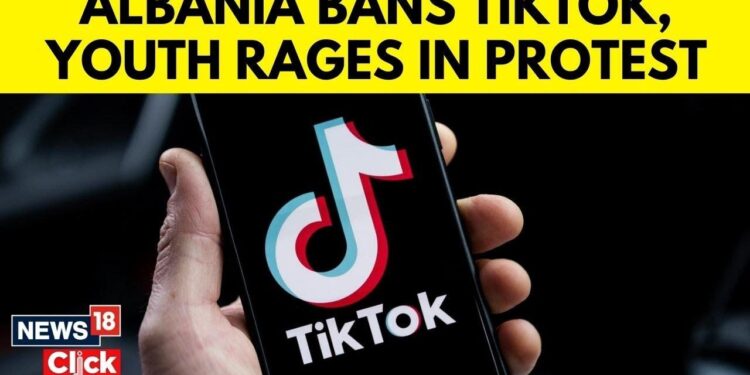Albania’s recent decision to impose a ban on TikTok has ignited a fierce debate over freedom of speech and digital rights within the country. The government cites concerns over national security and the protection of public morals as justification for the move, while critics argue that the ban threatens fundamental democratic freedoms and restricts citizens’ access to a popular platform for expression. As the ban takes effect, questions arise about the balance between state regulation and individual liberties in the rapidly evolving digital landscape.
Albania TikTok Ban Raises Questions About Digital Censorship and Government Control
The recent decision by Albanian authorities to restrict access to TikTok has ignited a heated debate over the balance between national security and individual freedoms. Critics argue that the ban, justified on grounds of protecting user data and combating misinformation, may be a veiled attempt to tighten government grip on digital expression. Social media activists and experts warn that such measures could set a precedent for further digital censorship, undermining the open access that defines the internet era.
Supporters of the ban emphasize concerns about data privacy risks and potential foreign influence, highlighting the need for stringent regulations on global platforms. Meanwhile, civil liberty advocates highlight key issues facing Albania’s digital landscape:
- Freedom of speech: Potential suppression of dissenting voices.
- Government transparency: Lack of clear guidelines on censorship policies.
- Impact on youth: Limitations on creative and social engagement.
| Aspect | Government Position | Civil Rights Concerns |
|---|---|---|
| User Data Privacy | Protect National Security | Risk of Overreach |
| Information Control | Prevent Misinformation | Potential Censorship |
| Access to Platforms | Limit Harmful Content | Restriction of Expression |
Experts Weigh In on Potential Impacts to Freedom of Expression and Youth Engagement
Leading analysts and free speech advocates have expressed concern that the Albanian government’s decision to ban TikTok may set a troubling precedent for digital expression. Censorship critics argue that restricting access to popular social platforms curtails the diversity of voices and ideas, particularly affecting younger generations who rely heavily on these channels for communication and creativity. Experts emphasize that such actions might undermine constitutional rights and open the door for broader limitations on internet freedom across the region.
Youth engagement specialists warn that the ban could inadvertently stifle civic participation and social interaction among Albania’s younger population, who have increasingly turned to TikTok as a tool for activism, education, and cultural exchange. Key points raised by scholars include:
- Reduced digital literacy: Limiting access hampers opportunities for young people to develop critical online skills.
- Expression silenced: Diverse voices risk being muted in a shifting media landscape dominated by fewer platforms.
- Engagement decline: Fewer channels for political and social dialogue may decrease youth participation in public affairs.
| Aspect | Potential Impact |
|---|---|
| Freedom of Speech | Risk of increased censorship and reduced media plurality |
| Youth Digital Engagement | Possible drop in online activism and content creation |
| Social Dynamics | Shift toward alternative, less regulated platforms |
Advocates Call for Transparent Policies and International Guidelines to Safeguard Online Speech
Human rights organizations and digital freedom advocates have voiced strong concerns following Albania’s sudden decision to ban TikTok, urging governments worldwide to establish clear, transparent frameworks that govern online speech without compromising fundamental rights. Experts emphasize the urgent need for international guidelines that balance national security concerns with the protection of free expression, ensuring that content moderation policies are fair, consistent, and publicly accessible. These calls highlight a growing tension between state control and digital liberties in an increasingly connected world.
Among the demands from advocates are:
- Clear definitions of harmful content that must be regulated without overreach
- Independent oversight mechanisms to review content restrictions and account government actions
- Transparency reports from platforms detailing the scale and nature of content removals or bans
- International cooperation to create harmonized policies that respect diverse legal and cultural contexts
| Key Issue | Advocate’s Position | Potential Impact |
|---|---|---|
| Policy Transparency | Mandatory disclosure of moderation criteria | Increases public trust |
| Content Oversight | Establish independent review boards | Reduces censorship risks |
| International Standards | Harmonize legal frameworks | Enhances global cooperation |
Insights and Conclusions
As Albania grapples with the implications of the TikTok ban, the controversy underscores a broader global tension between national security concerns and the protection of digital freedoms. While authorities argue the move safeguards public interest, critics warn it may set a worrying precedent for censorship and the restriction of free expression. The debate is likely to continue as Albania and other nations navigate the complex balance between regulation and individual rights in the digital age.
















